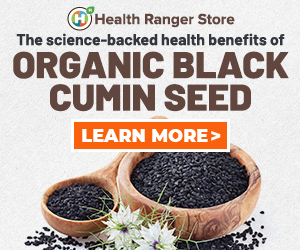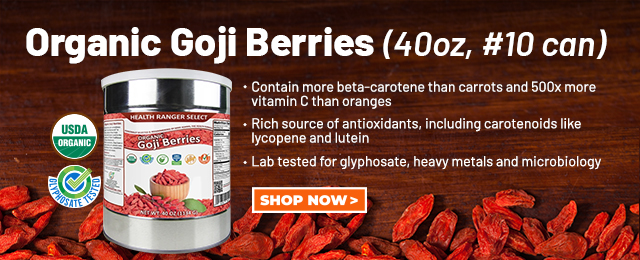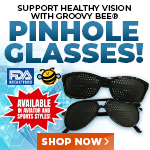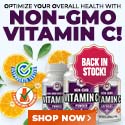
Vitamin D Halts Growth of Breast Cancer Tumors
 Monday, February 02, 2009 Monday, February 02, 2009by Mike Adams, the Health Ranger Editor of NaturalNews.com (See all articles...) Tags: Vitamin D, breast cancer, health news |
- Oncologist warns of ‘terrifyingly aggressive’ cancers in children, linked to immune suppression from COVID vaccines
- NIH study, buried for decades, reveals that Flu Shots INCREASE elderly deaths, not prevent them
- Musk targets “strangely wealthy” lawmakers in DOGE probe, names Pelosi, McConnell, Schumer
- COVID-19 scandal linked to CANCER SURGE: Billionaire researcher sounds alarm
- Ancient kitchen secrets REVEALED: How garlic, ginger and green onions fight cancer and heart disease
- DARPA: The shadowy innovator behind the world’s most advanced military technologies
- Millionaire fitness coach charged in Tesla vandalism incident as anti-Musk attacks escalate
- “Ethically sourced” human “bodyoids” could usher in a new era of medical exploitation, raising disturbing ethical questions
- Newly released JFK files reveal Pentagon's role in creating Lyme disease and covid in the same lab
- European Court of Justice: Healthcare professionals who promoted or administered COVID-19 vaccines are CRIMINALLY LIABLE for any harm caused
- Britain’s descent into police state censorship: Parents raided for questioning their daughter’s school system online
- RFK Jr. is pushing Big Pharma ad ban - and corporate media is panicking
- Tackling the rubber waste crisis: Groundbreaking study reveals eco-friendly method to recycle tires
- Homesteading Boom: How families are escaping cities to grow their own food
- Joseph Farrell’s “The Cosmic War”: Did an interplanetary conflict reshape the solar system?
- NYT admits U.S. ran Ukraine war operations-Russia's victory exposes obsolete NATO tactics, says Mike Adams
- Utah governor allows ban on LGBT pride flags in public buildings and schools, will take effect without his signature
- Civil war is here – Multiple events, from conservatives being “swatted,” to attacks against Telsa owners, happening across America as Dem politicians are telling supporters to ‘fight in the streets”
- Newly released JFK files reveal Pentagon's role in creating Lyme disease and covid in the same lab
- CDC finally halts $11 billion COVID funding scam as health officials admit the ‘pandemic’ was a fraud
- Analysis: The coming economic collapse, a mass uprising and Trump's three secret weapons to halt the growing revolt
- Kiss Your Genetic Privacy Good-Bye! 23andMe Gets Green Light to Sell Your Intimate Genetic Details to Anyone They Want
- Dr. Suzanne Humphries makes bombshell appearance on Joe Rogan podcast, exposing vaccine industry deception back to POLIOMYELITIS
- DEADLY DECEPTION: How COVID vaccines increased mortality rates and why authorities hid the truth
- Woman contracts WORLD'S DEADLIEST VIRUS after unknowingly being given the WRONG VACCINE
- Oncologist warns of ‘terrifyingly aggressive’ cancers in children, linked to immune suppression from COVID vaccines
- Here are TEN all-natural ways to protect your garden without using harmful chemicals
- Black cumin seed oil emerges as a powerful ally against breast cancer and chronic inflammation
- The hidden dangers in your kitchen: How cooking methods impact diabetes, cancer and aging
- Trump's greatest betrayal so far: Accelerating Middle East wars, silencing dissent, and serving Zionist masters
- Senate Democrats deny censorship industrial complex existed, defend government's role in silencing dissent
- Sugar-free deception: Artificial sweeteners hijack hunger signals, fuel obesity epidemic, study warns
- “Independent” anti-Russia outlet MEDUZA faces COLLAPSE as US funding dries up
- NIH study, buried for decades, reveals that Flu Shots INCREASE elderly deaths, not prevent them
- The Health Ranger releases “Vaccine Zombie” song and music video, using AI-animated zombies for the music video
- Discovery of vast underground city beneath Giza pyramids challenges human history
- Newly released JFK files reveal Pentagon's role in creating Lyme disease and covid in the same lab
- California's social media censorship law struck down: A victory for free speech or a threat to online safety?
- EPA advisor admits the agency is funneling billions to climate groups ahead of Trump’s return to White House
- The Health Ranger releases “Vaccine Zombie” song and music video, using AI-animated zombies for the music video
- Dr. Mike Yeadon releases 15-minute testimony - WATCH - about genocidal intent of COVID “vaccines”
- Florida takes a stand: DeSantis proposes permanent ban on mRNA vaccine mandates
- Mike Adams releases country western hit single: Goin’ Back in Time is Comin’ Home
- “Why we influenced the 2020 elections”: Facebook files reveal the coordinated effort to bury the Hunter Biden laptop story
- Unpacking the Lies That We’ve Been Fed – new song and music video released by Mike Adams, the Health Ranger
- House Intelligence Committee calls for the ARREST and PROSECUTION of Dr. Anthony Fauci
- The pandemic as a tool for INDOCTRINATION: Understanding “The Indoctrinated Brain” by Dr. Michael Nehls
- Rep. Nancy Mace introduces bill to ban biological males from female facilities on federal property
- Mike Adams releases music poetry sensation: A Child of God
- Sugarcane extract superior to cholesterol-lowering drugs?
- Survival 101: Effective EMF blocking techniques
- Michigan sheriff announces criminal investigation into 2020 election crimes, Dominion Voting Systems
- Peter Rost exposes Big Pharma corruption in his book “The Whistleblower: Confessions of a Healthcare Hitman”
- Migrants are taking advantage of recent hurricanes to scam residents and loot their homes
- Red Cross issues warning to stop blood plasma donations from vaccinated people
- Scientists confirm: GENIUS brain function can be spontaneously unleashed in humans without any apparent cause
- EPA advisor admits the agency is funneling billions to climate groups ahead of Trump’s return to White House
- HYSSOP: What research reveals about the health benefits of this ancient holy herb
- Two containers with completed ballots fall out of truck in Florida
- Fully vaccinated about to see “tsunami” of illness and death, warns virologist
- Global leaders unite to clamp down on “misinformation” with UN-backed Cascais Declaration
- BREAKING: 2025 NDAA authorizes mandatory military draft of WOMEN across America… as Pentagon pursues global NUCLEAR war with both Russia and China at the same time
- Michael Yon warns of a ZIONIST TAKEOVER in Trump’s second administration
- BOMBSHELL: DNA testing kits are a SCAM to develop ethnic-specific bioweapons
- Ozempic and Wegovy weight loss drugs are injectable LIZARD VENOM PEPTIDES that may unleash a devastating wave of organ failure… side effects align with symptoms of SNAKE BITES
- Israeli soldiers accused of even more torture and abuse in the West Bank
- These 13 countries just signed an agreement to engineer a global FAMINE by destroying food supply
- NASA admits that climate change occurs because of changes in Earth’s solar orbit, and NOT because of SUVs and fossil fuels
- RFK Jr. clears key hurdle: Sen. Susan Collins backs controversial HHS nominee, signaling a new era for health policy
- Sermon 30: How Jesus reveals Caesar’s FAKE CURRENCY and FALSE AUTHORITY
- Coriander seeds: Ancient medicine backed by modern science
- Arizona officials claim Maricopa County needs 10-13 days to tabulate results of the election
For example, today I wanted to research "Vitamin D" and "Breast Cancer." This produced a collection of well over 650 quotations on the subject from the various sources in my private library. A small sampling of those results are shown below.
The information you'll find in here is fascinating! You'll learn that vitamin D cream can be rubbed directly on tumors to make them vanish. You'll also learn how resveratrol can be used to amplify the results of vitamin D. There are also explanations on how vitamin D can be used to greatly reduce breast cancer cases in America, Canada, the UK and elsewhere.
I'll be using this tool in a big way here on NaturalNews from now on, bringing you research on herbs, nutrients, natural cures and many other topics. Each article here saves you the equivalent of hundreds of hours of time you might normally have to spend searching through books to find answers on the health topics that concern you.
To protect the authors and publishers of these books, we do several things: 1) All books are fully referenced and cited with the author's name. 2) Each book links to an Amazon.com link where readers can buy the book (so this citation of the book actually helps increase sales of the book, which benefits the author and publisher). 3) We LIMIT the quotes from any one book so that the amount of information cited from each book falls under Fair Use provisions. 4) We provide a second book analysis page that shows the keyword concepts used throughout the book, along with another link for purchasing the book.
In this way, we help NaturalNews readers get a hint of all the great information in these books while protecting the copyrights and promoting the interests of the authors. Please support these authors by purchasing the books mentioned below.
Here's the research we found on vitamin D and breast cancer:
The Experts Speak: Vitamin D and Breast Cancer
This activated form of vitamin D causes "cellular differentiation" — essentially the opposite of cancer. The following evidence indicates that vitamin D might have a protective role against breast cancer:• Synthetic vitamin D-like molecules have prevented the equivalent of breast cancer in animals.
• Activated vitamin D appears to have antiestrogenic activity. J
• Both sunlight and dietary exposure to vitamin D have correlated with a reduced risk of breast cancer.
- The Natural Pharmacy: Complete A-Z Reference to Natural Treatments for Common Health Conditions by Alan R. Gaby, M.D., Jonathan V. Wright, M.D., Forrest Batz, Pharm.D. Rick Chester, RPh., N.D., DipLAc. George Constantine, R.Ph., Ph.D. Linnea D. Thompson, Pharm.D., N.D.
- Available on Amazon.com
Results of one small study suggested that body stores of vitamin D may be associated with survival chances in women with advanced breast cancer. "Thirteen women with normal or high levels of active vitamin D survived the 6-month test period but, sadly, in those with low levels, 5 out of 13 died within 6 months," said Professor Barbara Mawer of the Manchester Royal Infirmary in central England.
- The Natural Pharmacist: Your Complete Guide to Reducing Cancer Risk by Richard Harkness
- Available on Amazon.com
A study comparing the health habits of 133 breast cancer patients with women who did not have the disease found that exposure to sunlight lowered the risk of breast cancer by 30 to 40% or more.
- The Natural Pharmacist: Your Complete Guide to Reducing Cancer Risk by Richard Harkness
- Available on Amazon.com
...when the same researchers looked at actual vitamin D levels, they found a 43 percent reduction in risk of breast cancer among women younger than 60 when comparing the highest levels of vitamin D (greater than 40) to lowest (less than 20). These findings are consistent with findings that cite a lower risk of breast cancer with increased ultraviolet light exposure, which means higher vitamin D levels are protective. Furthermore, researchers find higher activated vitamin D levels in women with less invasive and/or less advanced breast cancer.
- The Vitamin D Cure by James Dowd and Diane Stafford
- Available on Amazon.com
Two equally effective sources of vitamin D in humans are derived from plant ergosterol, which is converted to ergocalciferol (vitamin D2) and cholecalciferol (vitamin D3) by the action of sunlight on the skin. The body uses vitamin D3 for normal immune system function, to control cellular growth, and to absorb calcium from the digestive tract. Vitamin D3 can inhibit the growth of malignant melanoma, breast cancer, leukemia, and mammary tumors in laboratory animals. Vitamin D3 can also inhibit angiogenesis, the growth of new blood vessels that permit the spread of cancer cells through the body.
- Permanent Remissions by Robert Hass, M.S.
- Available on Amazon.com
Sun-starved females are at great risk for breast cancer, particularly women living in northern latitudes where wintertime sun exposure produces little vitamin D because of a decline in UV radiation in solar light. Dietary supplements are strongly recommended. Warnings that adults can overdose on vitamin D with daily oral doses exceeding 2,000 units are ill founded. Vitamin D's ability to inhibit breast cancer cell growth is enhanced by resveratrol, a red wine molecule. Resveratrol increases the vitamin D receptor sites on cells which sensitize the cells to vitamin D.
- You Don't Have to be Afraid of Cancer Anymore by Bill Sardi
- Available on Amazon.com
George's Hospital Medical School in London finds local production of vitamin D in breast tissue reduces the risk for breast cancer. For women with low breast tissue levels of vitamin D the risk for breast cancer rose by 354%! [Anticancer Research 26: 2573-80, 2006] This study suggests women sunbathe with breast tissue exposed to the sun to enhance local vitamin D production. The provision of 400 IU of vitamin D per day has been found to reduce the risk of pancreatic cancer by 43%.
- You Don't Have to be Afraid of Cancer Anymore by Bill Sardi
- Available on Amazon.com
Laboratory experiments show that vitamin D can inhibit the growth of human prostate cancer and breast cancer cells. Lung cancer and pancreatic cancer cells may also be susceptible to the effects of vitamin D. Sunlight also seems to be protective against several types of cancer, including ovarian and breast cancers, and this effect may be mediated by vitamin D levels.
- The New Encyclopedia of Vitamins, Minerals, Supplements and Herbs by Nicola Reavley
- Available on Amazon.com
In animals fed a high fat diet, which normally would produce a higher incidence of colon cancer, supplements of calcium and vitamin D blocked this carcinogenic effect of the diet. Vitamin D inhibits the growth of breast cancer in culture, and also seems to subdue human breast cancer. Cells from human prostate cancer were put into a "...permanent nonproliferative state.", or shut down the cancer process, by the addition of vitamin D. Human cancer cells have been shown to have receptor sites, or stereo specific "parking spaces" for vitamin D.
- Beating Cancer with Nutrition by Patrick Quillin, PhD,RD,CNS
- Available on Amazon.com
These findings are consistent with findings that cite a lower risk of breast cancer with increased ultraviolet light exposure, which means higher vitamin D levels are protective. Furthermore, researchers find higher activated vitamin D levels in women with less invasive and/or less advanced breast cancer.
- The Vitamin D Cure by James Dowd and Diane Stafford
- Available on Amazon.com
When Japanese women move to the United States, their vitamin D intake sinks and their breast cancer rates skyrocket. Further, vitamin D slows the rate of growth of cancer cells in lab studies and cuts the rate of cancer in animals in half. All American women should eat foods with at least 400 IU of vitamin D per day, says Dr. Garland. The best sources of vitamin D are fatty fish, such as salmon, sardines, mackerel, herring and tuna as well as vitamin-D-fortified milk (make it skim). But the richest source of vitamin D in the world is eel, popular in Japanese sushi bars.
- Food Your Miracle Medicine by Jean Carper
- Available on Amazon.com
But how does vitamin D actually work? For many years that was a mystery. The "revolution of information" on vitamin D began in 1968, when J.W. Blunt and colleagues discovered the form of vitamin D that actually circulates in the blood (25-OH-D3). This hormonal form of the vitamin, created in the kidneys, is ultimately responsible for the classical action of the vitamin. At the molecular level, some cancer cells appear to have receptors on their surfaces that are capable of receiving the vitamin D molecule.
- Cancer Therapy: The Independent Consumer's Guide To Non-Toxic Treatment & Prevention by Ralph W. Moss, Ph.D.
- Available on Amazon.com
This could explain the incidence of breast cancer being higher in cold climates than in warm. Vitamin D lack in cold climates is also a possible explanation. To the hazards which clearly contribute towards breast cancer, hormones (estrogen), high- fat diet, abortion and family history there is one more problem. That is organochlorines. There are more than 10,000 different organochlorines, including chlordane, DDT, dioxin, vinyl chloride, atrazine, and CFCs. Studies routinely show that women with breast cancer have high tissue levels of organochlorines .
- A Physician's Guide To Natural Health Products That Work by James A. Howenstine, MD
- Available on Amazon.com
Most of 63 recently reviewed studies found a protective effect between vitamin D status and cancer risk. A study presented at the 2006 American Association for Cancer Research meeting suggested that an increase in vitamin D lowered the risk of developing breast cancer by up to 50 percent. How might vitamin D help? It's the body's most potent regulator of cell growth, preventing cells from becoming malignant, explains Michael Holick, MD, PhD, head of the Vitamin D, Skin, and Bone Research Laboratory at Boston University School of Medicine.
- Food Synergy: Unleash Hundreds of Powerful Healing Food Combinations to Fight Disease and Live Well by Elaine Magee
- Available on Amazon.com
Those whose cancers had such vitamin D receptors "had significantly longer disease-free survival" periods than those whose tumors did not. Vitamin D also stopped the growth of several kind of human breast cancer cells in the test tube. Treatment of mice with breast cancer "produced significant inhibition of tumor progression," according to pathologists at St George's Hospital Medical School in London, UK. Taken together, these studies suggest vitamin D may inhibit the growth of cancers that have receptors for the vitamin.
- Cancer Therapy: The Independent Consumer's Guide To Non-Toxic Treatment & Prevention by Ralph W. Moss, Ph.D.
- Available on Amazon.com
Sunlight exposure, which leads to an increased level of vitamin D, correlates with a reduced risk of breast cancer. I usually recommend small amounts of vitamin D (400 to 1,000 IU) for those people without sunlight exposure, especially during the winter. I also occasionally recommend cod liver oil during the winter months as a source of vitamin D and omega-3 fatty acids. Vitamin D deficiency is very common in the elderly and in people who live in parts of the world with little sunlight; it is also one of the major contributing factors to osteoporosis.
- Herbal Medicine, Healing and Cancer: A Comprehensive Program for Prevention and Treatment by Donald R. Yance, j r.,C.N., M.H., A.H.G., with Arlene Valentine
- Available on Amazon.com
With the discovery of breast cancer-associated gene mutations (BRCA1 and BRCA2), which dramatically increase the risk for getting breast cancer, many women thought a cure might be just around the corner. However, researchers detect these mutations in only about one in three hundred to five hundred people — and they account for only about 2 percent of breast cancers.
- The Vitamin D Cure by James Dowd and Diane Stafford
- Available on Amazon.com
Sunscreen is promoted for preventing skin cancer, but it also prevents the formation of vitamin D, an antioxidant which inhibits the initiation phase of breast cancer. Habitual sunscreen users have unusually low levels of vitamin D. Mineral oil, found in many skincare products, also blocks production and absorption of vitamin D.
- Breast Cancer? Breath Health! The Wise Woman Way by Susun S. Weed
- Available on Amazon.com
A clinical trial of Vitamin D provided encouraging results. Patients with locally advanced breast cancer were given a highly active Vitamin D analogue cream to rub on their tumours. "It was effective in one third of the tumours," said Professor Charles Coombes, clinical oncologist, Charing Cross Hospital, London.
- Bartram's Encyclopedia of Herbal Medicine: The Definitive Guide by Thomas Bartram
- Available on Amazon.com
Your skin can manufacture its own D with roughly 15 minutes of sun exposure three or four days a week. If you shun the sun, you should be getting a minimum of 700 IU of vitamin D3 a day; 1,000 IU daily might be even better, but don't go overboard because vitamin D can be toxic at very high doses.
- Best Choices From the People's Pharmacy by Joe Graedon, M.S. and Teresa Graedon, Ph.D.
- Available on Amazon.com
Now, sulfur dioxide (a main ingredient in smog) absorbs ultraviolet light in the very part of the spectrum that triggers the production of vitamin D in the skin. 'Acid haze' (a high concentration of sulfur dioxide in the air) may thus lead to vitamin D deficiencies and therefore breast and colon cancer. In 20 Canadian cities, there was a positive association between air pollution and the death rate from colon cancer in both women and men, as well as breast cancer in women.
- Cancer Therapy: The Independent Consumer's Guide To Non-Toxic Treatment & Prevention by Ralph W. Moss, Ph.D.
- Available on Amazon.com
The collected data showed that individuals in the group with the lowest blood levels of vitamin D had the highest rates of breast cancer, and the breast cancer rates dropped as the blood levels increased. The most astounding finding in this study is that the blood level associated with a 50 percent lower risk of breast cancer could be reached by spending as little as 25 minutes in the sun for darker skinned people, and no more than 10 to 15 minutes for lighter skinned individuals.
- Timeless Secrets of Health & Rejuvenation: Unleash The Natural Healing Power That Lies Dormant Within You by Andreas Moritz
- Available on Amazon.com
...there is mounting evidence that vitamin D from sunlight and fish oil may reduce the incidence of certain cancers, such as breast cancer. Hence, some vitamin D residuals in the fish oil may actually increase its protective value against cancer as well as CHD.
- Textbook of Natural Medicine 2nd Edition Volume 1 by Michael T. Murray, ND
- Available on Amazon.com
New and exciting studies suggest that vitamin D does indeed protect against colorectal and breast cancers and that it may be beneficial in the treatment of certain cancers. There is speculation that chronic vitamin D deficiency finally shows up as cancer of the breast and colon.
- The Doctor's Vitamin and Mineral Encyclopedia by Sheldon Saul Hendler
- Available on Amazon.com
Vitamin D is also important in reducing breast cancer, with increased intake of both calcium and vitamin D showing good results.
- Eat To Beat Cancer: A Research Scientist Explains How You and Your Family Can Avoid Up to 90% of All Cancers by J. Robert Hatherill
- Available on Amazon.com
Women with breast cancer are twice as likely to have a fault in the gene required to utilize vitamin D, according to Joseph Mercola, D.O. New research from London suggests that women with polymorphisms (genetic variations) of the vitamin D receptor gene may be less able to benefit from the nutrient. The study added to the increasing evidence that vitamin D receptor gene polymorphisms play a role in the disease process (Bretherton-Watt et al. 2001).
- Disease Prevention and Treatment by The Life Extension Editorial Staff
- Available on Amazon.com
There is some evidence that vitamin D can help transform breast cancer cells into healthy cells. Vitamin D supplements are not necessary; all that is needed for the body to manufacture adequate amounts of vitamin D for fighting cancer is to expose your hands and face to sunlight for twenty minutes each day. Do not use sunscreen during this twenty-minute period, since sun blocks screen out the kind of ultraviolet light that stimulates the natural production of the vitamin.
- Prescription for Herbal Healing: An Easy-to-Use A-Z Reference to Hundreds of Common Disorders and Their Herbal Remedies by Phyllis A. Balch, CNC
- Available on Amazon.com
Vitamin D also lessens rheumatoid arthritis, osteoporosis, hip fractures, multiple sclerosis, psoriasis, breast cancers (in areas of low solar radiation); intestinal, colon and rectal cancers; prostate cancers, and increases Lymphocytes against Candida. Full-spectrum lights on rodents slowed tumor development. Moderate ultraviolet light stimulates metabolism; the short ultraviolet rays are germicidal; improve Immunity, trigger an anti-cancer Enzyme; stimulate Vitamin D formation, saliva, and improve Calcium and Phosphorus metabolism.
- Anti-Aging Manual: The Encyclopedia of Natural Health by Joseph E. Mario
- Available on Amazon.com
Diseases and conditions caused by vitamin D deficiency:
* Osteoporosis is commonly caused by a lack of vitamin D, which impairs calcium absorption.
* Sufficient vitamin D prevents prostate cancer, breast cancer, ovarian cancer, depression, colon cancer, and schizophrenia.
* "Rickets" is the name of a bone-wasting disease caused by vitamin D deficiency.
* Vitamin D deficiency may exacerbate type 2 diabetes and impair production of insulin in the pancreas.
* Obesity impairs vitamin D utilization in the body, meaning obese people need twice as much vitamin D.
- Natural Health Solutions by Mike Adams
- Available on Amazon.com
Vitamin D at FETCH.news
Get independent news alerts on natural cures, food lab tests, cannabis medicine, science, robotics, drones, privacy and more.
 About the author:Mike Adams (aka the "Health Ranger") is a best selling author (#1 best selling science book on Amazon.com) and a globally recognized scientific researcher in clean foods. He serves as the founding editor of NaturalNews.com and the lab science director of an internationally accredited (ISO 17025) analytical laboratory known as CWC Labs. There, he was awarded a Certificate of Excellence for achieving extremely high accuracy in the analysis of toxic elements in unknown water samples using ICP-MS instrumentation. Adams is also highly proficient in running liquid chromatography, ion chromatography and mass spectrometry time-of-flight analytical instrumentation.
About the author:Mike Adams (aka the "Health Ranger") is a best selling author (#1 best selling science book on Amazon.com) and a globally recognized scientific researcher in clean foods. He serves as the founding editor of NaturalNews.com and the lab science director of an internationally accredited (ISO 17025) analytical laboratory known as CWC Labs. There, he was awarded a Certificate of Excellence for achieving extremely high accuracy in the analysis of toxic elements in unknown water samples using ICP-MS instrumentation. Adams is also highly proficient in running liquid chromatography, ion chromatography and mass spectrometry time-of-flight analytical instrumentation.
Adams is a person of color whose ancestors include Africans and Native American Indians. He's also of Native American heritage, which he credits as inspiring his "Health Ranger" passion for protecting life and nature against the destruction caused by chemicals, heavy metals and other forms of pollution.
Adams is the founder and publisher of the open source science journal Natural Science Journal, the author of numerous peer-reviewed science papers published by the journal, and the author of the world's first book that published ICP-MS heavy metals analysis results for foods, dietary supplements, pet food, spices and fast food. The book is entitled Food Forensics and is published by BenBella Books.
In his laboratory research, Adams has made numerous food safety breakthroughs such as revealing rice protein products imported from Asia to be contaminated with toxic heavy metals like lead, cadmium and tungsten. Adams was the first food science researcher to document high levels of tungsten in superfoods. He also discovered over 11 ppm lead in imported mangosteen powder, and led an industry-wide voluntary agreement to limit heavy metals in rice protein products.
In addition to his lab work, Adams is also the (non-paid) executive director of the non-profit Consumer Wellness Center (CWC), an organization that redirects 100% of its donations receipts to grant programs that teach children and women how to grow their own food or vastly improve their nutrition. Through the non-profit CWC, Adams also launched Nutrition Rescue, a program that donates essential vitamins to people in need. Click here to see some of the CWC success stories.
With a background in science and software technology, Adams is the original founder of the email newsletter technology company known as Arial Software. Using his technical experience combined with his love for natural health, Adams developed and deployed the content management system currently driving NaturalNews.com. He also engineered the high-level statistical algorithms that power SCIENCE.naturalnews.com, a massive research resource featuring over 10 million scientific studies.
Adams is well known for his incredibly popular consumer activism video blowing the lid on fake blueberries used throughout the food supply. He has also exposed "strange fibers" found in Chicken McNuggets, fake academic credentials of so-called health "gurus," dangerous "detox" products imported as battery acid and sold for oral consumption, fake acai berry scams, the California raw milk raids, the vaccine research fraud revealed by industry whistleblowers and many other topics.
Adams has also helped defend the rights of home gardeners and protect the medical freedom rights of parents. Adams is widely recognized to have made a remarkable global impact on issues like GMOs, vaccines, nutrition therapies, human consciousness.
In addition to his activism, Adams is an accomplished musician who has released over a dozen popular songs covering a variety of activism topics.
Click here to read a more detailed bio on Mike Adams, the Health Ranger, at HealthRanger.com.
Take Action: Support Natural News by linking to this article from your website
Permalink to this article:
Embed article link: (copy HTML code below):
Reprinting this article:
Non-commercial use OK, cite NaturalNews.com with clickable link.
Follow Natural News on Facebook, Twitter, Google Plus, and Pinterest
Science News & Studies
Medicine News and Information
Food News & Studies
Health News & Studies
Herbs News & Information
Pollution News & Studies
Cancer News & Studies
Climate News & Studies
Survival News & Information
Gear News & Information
News covering technology, stocks, hackers, and more



"Big Tech and mainstream media are constantly trying to silence the independent voices that dare to bring you the truth about toxic food ingredients, dangerous medications and the failed, fraudulent science of the profit-driven medical establishment.
Email is one of the best ways to make sure you stay informed, without the censorship of the tech giants (Google, Apple, Facebook, Twitter, YouTube, etc.). Stay informed and you'll even likely learn information that may help save your own life."
–The Health Ranger, Mike Adams













































